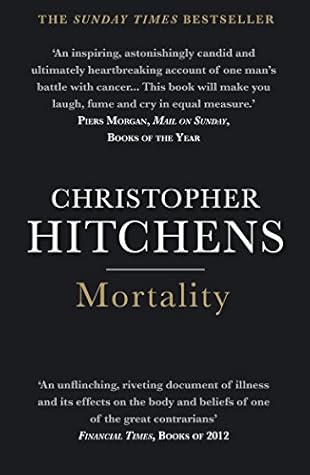More on this book
Community
Kindle Notes & Highlights
And to all of us, his readers, Christopher Hitchens will be remembered for the words he left behind. These last ones, free as they are of sentiment or self-pity, are among his last. They are also among his best.
My father had died, and very swiftly, too, of cancer of the esophagus. He was seventy-nine. I am sixty-one. In whatever kind of a “race” life may be, I have very abruptly become a finalist.
To the dumb question “Why me?” the cosmos barely bothers to return the reply: Why not?
In the war against Thanatos, if we must term it a war, the immediate loss of Eros is a huge initial sacrifice.
The absorbing fact about being mortally sick is that you spend a good deal of time preparing yourself to die with some modicum of stoicism (and provision for loved ones), while being simultaneously and highly interested in the business of survival.
A different secular problem also occurs to me: What if I pulled through and the pious faction contentedly claimed that their prayers had been answered? That would somehow be irritating.
Pascal assumes both a cynical god and an abjectly opportunist human being. Suppose I ditch the principles I have held for a lifetime, in the hope of gaining favor at the last minute? I hope and trust that no serious person would be at all impressed by such a hucksterish choice. Meanwhile, the god who would reward cowardice and dishonesty and punish irreconcilable doubt is among the many gods in which (whom?) I do not believe.
“Until you have done something for humanity,” wrote the great American educator Horace Mann, “you should be ashamed to die.”
It’s no fun to appreciate to the full the truth of the materialist proposition that I don’t have a body, I am a body.
I’ll do the facing of hard facts, thanks. Don’t you be doing it too. And yet I had absolutely invited the question. Telling someone else, with deliberate realism, that once I’d had a few more scans and treatments I might be told by the doctors that things from now on could be mainly a matter of “management,” I again had the wind knocked out of me when she said, “Yes, I suppose a time comes when you have to consider letting go.” How true, and how crisp a summary of what I had just said myself. But again there was the unreasonable urge to have a kind of monopoly on, or a sort of veto over, what
...more
The irony is that only he can say that it is only he that can speak bluntly of cancer; or suggest that this is "solipsistic".
The honesty, nobility, and profundity of his persistent contrarianism and self-scrutinisation - as well as comment on treatment, etiquette, and segregation - under such crippling trauma is not only admirable but fascinating.
It ought to be an offense to be excruciating and unfunny in circumstances where your audience is almost morally obliged to enthuse. This was as much an intrusion, in its way, as that of the relentless motherly persecutor with whom I began. As the populations of Tumortown and Wellville continue to swell and to “interact,” there’s a growing need for ground rules that prevent us from inflicting ourselves upon one another.
Hitchens believes that there is an equal and valid possibility for the unwell to inflict discomfort upon the well.
On the less good days, I feel like that wooden-legged piglet belonging to a sadistically sentimental family that could bear to eat him only a chunk at a time. Except that cancer isn’t so … considerate.
Almost like the threatened loss of my voice, which is currently being alleviated by some temporary injections into my vocal folds, I feel my personality and identity dissolving as I contemplate dead hands and the loss of the transmission belts that connect me to writing and thinking.
So far, I have decided to take whatever my disease can throw at me, and to stay combative even while taking the measure of my inevitable decline. I repeat, this is no more than what a healthy person has to do in slower motion. It is our common fate. In either case, though, one can dispense with facile maxims that don’t live up to their apparent billing.
I’m not fighting or battling cancer—it’s fighting me. Brave? Hah! Save it for a fight you can’t run away from. Saul Bellow: Death is the dark backing that a mirror needs if we are able to see anything.
If I convert it’s because it’s better that a believer dies than that an atheist does.
With infinite life comes an infinite list of relatives. Grandparents never die, nor do great-grandparents, great-aunts … and so on, back through the generations, all alive and offering advice. Sons never escape from the shadows of their fathers. Nor do daughters of their mothers. No one ever comes into his own … Such is the cost of immortality. No person is whole. No person is free.
A beautiful concluding and somewhat eponymous poem, preceded by a review that is brief and clustered but no less filled with wisdom.
An intimate and personal exploration of thd character, wit, and sincerity of a life nearing the end.
When I do, I hear him, and he has the last word. Time after time, Christopher has the last word.
One of the greatest posthumous afterwords and eulogies imaginable, written by his wife.
This book was less about what I expected it to be: his approach and response to mortality (although this is touched on); but rather how people expected him to respond, and how they treated him differently; as well as detailings of the plight of enduring esophageal cancer.


